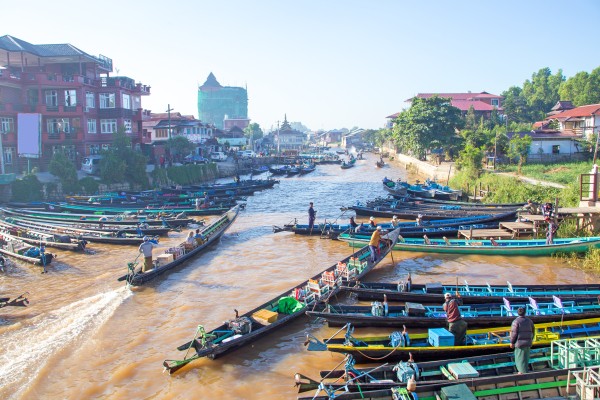Preserving Impact Investment in Myanmar
Please note if you disable cookies, you may not be able to make use of certain functionalities such as viewing embedded YouTube videos or social media sharing.
Please note if you disable cookies, you may not be able to make use of certain functionalities such as viewing embedded YouTube videos or social media sharing.
In January 2021, FMO and CDC launched the Myanmar Enabling Investment Program (MEIP). MEIP was a market shaping initiative designed to address systemic barriers inhibiting impact-oriented investment flows to Myanmar, a country in which FMO has grown its portfolio and with a focus on the MFI sector. Under FMO, MEIP was funded by MASSIF, the financial inclusion fund FMO manages on behalf of the Dutch government. It was implemented by MEDA.
However, on 1 February 2021, a military coup hurled Myanmar into crisis. The coup has had profound implications for its people, economy, and global standing. Further, in the months that followed, investors wrestled with whether or not to remain invested and how best to preserve impact. They faced severe political, economic, and social disruptions, increased scrutiny, and pressing operational concerns like risks to staff safety and limited access to cash. As a result, investors restructured their Myanmar engagements, shifting from actively evaluating potential investment opportunities to ensuring the financial and operational resiliency of their current assets.
The changed circumstances and stakeholder response made many of MEIP’s original planned activities irrelevant. In response, MEIP adapted its approach, supporting investors and portfolio companies to navigate the crisis and redefine their roles and responsibilities with a new goal of preserving impact.
To do so, MEIP focused its activities to two core objectives:
MEIP focused support to and through the Myanmar Private Equity and Venture Capital Association (MPE&VCA), recognizing its unique role as a convener of local and international investors and companies in Myanmar. MEIP provided direct organizational support to MPE&VCA, developing the requisite resources, networks and tools to sustain and adapt operations while positioning it to provide timely guidance to its members and other companies.

Guidance included leadership coaching and peer consultations for fund managers and portfolio executives on topics such as exercising leadership in times of crisis, crisis management workshops addressing investor dilemmas, and webinars targeted to fund managers and associates on topics that included Valuation of Portfolio Companies in a Crisis and Navigating Political and Economic Crisis for Funds.
MEIP facilitated a process of inquiry and debate amongst DFIs, DPs, private investors, companies and other ecosystem actors. These extensive, confidential stakeholder consultations completed through individual engagement as well as facilitated roundtables yielded a common and prioritized set of risks and recommendations for collective action, including evaluating military exposure, protecting current operations, opportunities for financial and non-financial assistance, and evaluating reputational risks.
They also established priorities for responsible investment in post-coup Myanmar as well as a process of continued consultation and collaboration that gave participants the confidence to progress assistance at a tenuous but critical time.

MEIP’s adaptation and approach offer valuable reflections for investors and technical assistance activities in fragile and conflict-affected situations (FCAS).
Market shaping activities and technical assistance facilities can play a valuable role toward supporting DFIs, private investors, and portfolio companies to navigate uncertainty and crisis that often accompanies operations in fragile contexts, including the following:
MEIP’s activities brought together a coalition of actors, facilitating information sharing, networking and guidance that is helping DFIs, donors, funds, and portfolio companies to define their roles and responsibilities in post-coup Myanmar and move forward with support at a critical time. The consultative process of inquiry and facilitated debate enabled DFIs to share experiences, identify common risks, and prioritize collective solutions.
MEIP’s support to MPE&VCA enabled the association to pivot its support to members, providing valuable information and networking events to problem-solve and adapt operations to survive.
MPE&VCA plays a vital role in the nascent Myanmar investment ecosystem: a PE/VC association can provide valuable information for investors entering a market and serve a coordinating function to improve efficiency amongst members. Reinforcing MPE&VCA’s sustainability and fit-for-purpose offering generates wider impact and value.
CDC and FMO commissioned the MEIP Case Study, written by Kim Beevers and Naithy Cyriac, which more fully outlines the programme’s adaptation. It includes activities designed to strengthen partner and market capacity to adapt and endure the post-coup crisis period as well as structural elements that enabled the programme’s agility. Finally, it also describes the potentially valuable risk mitigation role that market shaping technical assistance can play in fragile and conflict-affected contexts.